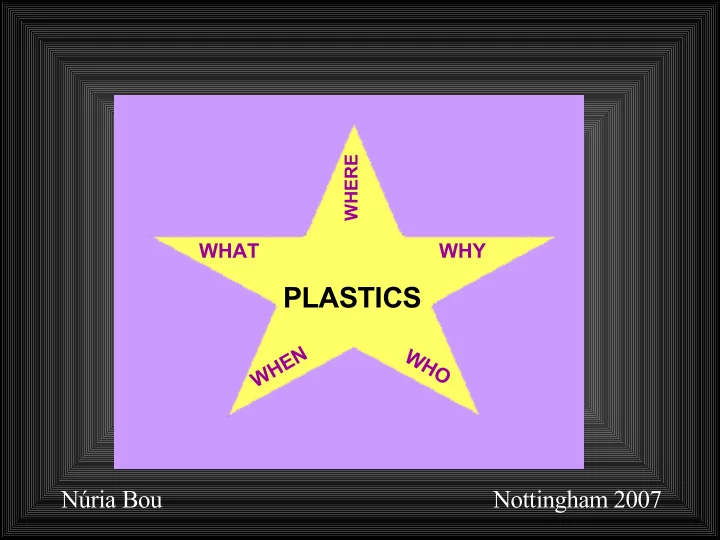

WHERE WHAT WHY PLASTICS N WHO E H W Núria Bou Nottingham 2007
WH WHAT WHY PLASTICS WHEN WHO Núria Bou Nottingham 2007
IES VALLDEMOSSA
EVOLUTION OF CLIL Year 1st ESO 2nd ESO 3rd ESO 4th ESO Batxillerat Students 1999 30 2005 140 2006 230 Future 500 Optional credits Compulsory subjects Not done yet
OTHER FEATURES • IES Valldemossa has the support of : - Department of Education - British Council - Pompeu Fabra University • Exchange programme with Lymm High School. • Issues: - Parents - Staff
MATERIALS-1 1.2 1.1 Materials Objects Comparing Taking decisions for using a different material or another and for 1.3 materials using tools and machines Classifying Properties and different 2.1 plastics Objects 1. Are metals 1.2 1.1 Materials better than Objects 2.2 Advantatges plastics? Identify processes Comparing 2. Plastics in and disadvantages or kinds of plastics natural our lives. in real life objects Specific polymers 1.3 Cognition vocabulary with plastics Properties 2.1 Objects 1. Are metals 2.3 Types better than 2.2 Advantatges Predicting Listening plastics? 2.4 2. Plastics in Analysing and disadvantages our lives. Language of Recycling Discussion Content Reading learning skills skills 3.1 Monomers 2.3 Types and Polymers 2.4 Language for Recycling Writting PLASTICS 3. Have you Communication learning Content 4.1 Manufacturing ever heard of 3.1 Monomers and Polymers processes 3.2 polymers? 3. Have you Presentation Collaborative Origins Language 4.1 Manufacturing language ever heard of skills processes through 3.2 polymers? 4. Giving learning Origins 4.2 shape to Importance 4. Giving 3.3 Simulation 4.2 plastics. of recycling shape to Asking Making 3.3 Structures Simulation plastics. hypothesis questions Structures Responsability when 3.5 3.5 3.4 3.4 Culture buying consumer Properties Properties Synthesis Synthesis goods 4.3 Tools and 4.3 Tools and machines machines 4.5 Vacuum 4.4 Folding former Respect when 4.5 Vacuum Comparison with other machine playing countries: toys and former 4.4 Folding measure units Reuse machine
MATERALS-2 • Examples of different types of materials: - Jigsaw - Roleplay - Powerpoint presentation and grid - Game
MATERIALS-2 • Examples of different types of materials: - Jigsaw - Roleplay - Manufacturing processes and grid - Game
JUSTIFICATION Points taken into account: • Age of the students. • Content: 4 units, from the general to the concrete. • Language: writing and speaking support, from more to less. • Cognition: predictions, different types of activities including practical work, trying to be at their ZPD. • Culture: present principally in unit 2.
STAKEHOLDERS CLIL team Management team Students in PLASTICS credit
REFERENCES Pictures and some of the activities were obtained from these references ACKNOWLEDGEMENTS • Department of Education • British Council •Nottingham University Thank you!!! Do Coyle Philip Hood Stephen Bailey John Clegg
Recommend
More recommend